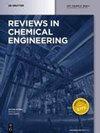Innovative fouling-resistant materials for industrial heat exchangers: a review
IF 4.9
3区 工程技术
Q1 ENGINEERING, CHEMICAL
引用次数: 5
Abstract
Abstract Fouling of heat exchangers (HEs) has become a major concern across the industrial sector. Fouling is an omnipresent phenomenon but is particularly prevalent in the dairy, oil, and energy industries. Reduced energy performance that results from fouling represents significant operating loss in terms of both maintenance and impact on product quality and safety. In most industries, cleaning or replacing HEs are currently the only viable solutions for controlling fouling. This review examines the latest advances in the development of innovative materials and coatings for HEs that could mitigate the need for costly and frequent cleaning and potentially extend their operational life. To better understand the correlation between surface properties and fouling occurrence, we begin by providing an overview of the main mechanisms underlying fouling. We then present selected key strategies, which can differ considerably, for developing antifouling surfaces and conclude by discussing the current trends in the search for ideal materials for a range of applications. In our presentation of all these aspects, emphasis is given wherever possible to the potential transfer of these innovative surfaces from the laboratory to the three industries most concerned by HE fouling problems: food, petrochemicals, and energy production.工业热交换器新型防污材料综述
摘要换热器(HEs)的污垢已成为整个工业部门的一个主要问题。污垢是一种普遍存在的现象,但在乳制品、石油和能源行业尤为普遍。污垢导致的能源性能降低意味着在维护以及对产品质量和安全的影响方面存在重大的运行损失。在大多数行业中,清洁或更换HEs是目前控制污垢的唯一可行解决方案。这篇综述考察了HEs创新材料和涂层开发的最新进展,这些材料和涂层可以减少昂贵和频繁的清洁需求,并可能延长其使用寿命。为了更好地理解表面性质和结垢发生之间的相关性,我们首先概述了结垢的主要机制。然后,我们提出了开发防污表面的关键策略,这些策略可能会有很大的不同,并通过讨论当前寻找适用于各种应用的理想材料的趋势来总结。在我们对所有这些方面的介绍中,尽可能强调将这些创新表面从实验室转移到最受HE污染问题关注的三个行业:食品、石化和能源生产。
本文章由计算机程序翻译,如有差异,请以英文原文为准。
求助全文
约1分钟内获得全文
求助全文
来源期刊

Reviews in Chemical Engineering
工程技术-工程:化工
CiteScore
12.30
自引率
0.00%
发文量
37
审稿时长
6 months
期刊介绍:
Reviews in Chemical Engineering publishes authoritative review articles on all aspects of the broad field of chemical engineering and applied chemistry. Its aim is to develop new insights and understanding and to promote interest and research activity in chemical engineering, as well as the application of new developments in these areas. The bimonthly journal publishes peer-reviewed articles by leading chemical engineers, applied scientists and mathematicians. The broad interest today in solutions through chemistry to some of the world’s most challenging problems ensures that Reviews in Chemical Engineering will play a significant role in the growth of the field as a whole.
 求助内容:
求助内容: 应助结果提醒方式:
应助结果提醒方式:


